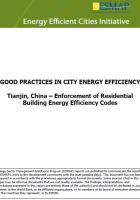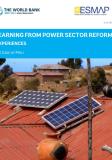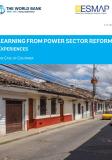Publications
Tianjin is one of the most successful Chinese cities in compliance enforcement of building energy efficiency codes (BEECs). Results of recent annual national inspections organized by the Ministry of Housing and Urban and Rural Development (MoHURD) indicate that compliance of BEECs in new residential and commercial buildings in Tianjin is close to 100 percent, compared to the 80 percent average across nearly three dozen large cities inspected by MoHURD in 2008. More remarkable is the fact that, in terms of building envelope thermal integrity, the currently enforced residential BEEC in Tianjin (identified as DB29-1-2007) is 30 percent more stringent than what is required by the pertinent national BEEC (identified as JGJ 26-95).
In 1997, Tianjin introduced its first mandatory residential BEEC (identified as DB29-1-97), which is equivalent to the requirements of the JGJ 26-95, the national model BEEC for cold climate regions enacted in 1995. DB29-1-97 was enforced from 1998 to 2004. Enforcement actually began on January 1, 2005; it was based on an earlier version which was updated and reenacted on June 1, 2007. This case study covered five years of enforcement of DB29-1-2007, from 2005 to 2009.
From 2005 to 2009, about 70 million m2 of new residential buildings were completed in the urban areas of Tianjin. Many were subject to compliance of DB29-1-97 because their construction permits were issued before January 1, 2005. About 50 million m2 of them were designed according to Tianjin’s DB29-1-2007. This puts the upper range (assuming full construction compliance) of the calculated space heating energy savings of these new buildings at about 870 GWh/year, compared with the baseline of complying with DB29-1-97 (or the national JGJ 26-95). Heat energy saved would be sufficient to provide winter space heating for about 200,000 apartments (at 100 m2 each) built to comply with DB29-1-2007. Compared with the baseline, the estimated simple payback period for compliance with DB29-1-2007 based on avoided cost of heating service is less than seven years, attractive even if the energy efficiency (EE) measures have a lifespan of 15 years.
Tianjin’s efforts to go beyond national BEEC requirements marked a departure from the mostly central government-driven BEEC regulation of the past in China. Tianjin began piloting residential BEEC in the late 1980s, despite the fact that it has taken about 15 years for Tianjin to achieve a high degree of compliance. Tianjin has demonstrated the importance of the following factors in achieving BEEC compliance: (i) a well-established building construction management system, (ii) standardized and structured procedures for compliance enforcement, (iii) broad-based capacity of the construction trades to meet compliance requirements, including technical skills and availability of parts and materials, (iv) consumers’ ability and willingness to pay for the costs of BEEC compliance, and (v) local government resources, support, and commitment to implementing increasingly stringent BEECs.
ESMAP. 2011. Good Practices in City Energy Efficiency: Tianjin, China - Enforcement of Residential Building Energy Efficiency Codes. ESMAP Energy Efficient Cities Initiative. Washington, DC: World Bank.



